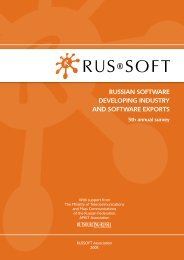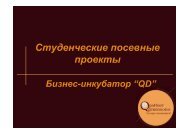russian software developing industry and software exports
russian software developing industry and software exports
russian software developing industry and software exports
You also want an ePaper? Increase the reach of your titles
YUMPU automatically turns print PDFs into web optimized ePapers that Google loves.
Conclusions<br />
Generally, the global economic crisis has negatively<br />
affected <strong>exports</strong> of Russian <strong>software</strong> developers,<br />
but at the same time it produced a healing effect<br />
on the <strong>industry</strong> enabling companies to optimize<br />
their structure <strong>and</strong> reduce expenses primarily on the<br />
lease of premises <strong>and</strong> staff. The devaluation of the<br />
Russian currency against the dollar has positively<br />
influenced the competitiveness of Russian companies.<br />
A sharply negative impact of the crisis was reported<br />
only by 20% of export companies participating in the<br />
poll, although the effect of crisis as the main factor<br />
influencing the market was mentioned by 80% of<br />
respondents. For 4% of companies the effect of the<br />
crisis was obviously beneficial.<br />
According to 2008 results, the volume of Russian<br />
<strong>exports</strong> of <strong>software</strong> <strong>and</strong> development services<br />
reached USD 2.65 bn. Russian companies continued<br />
to develop the niche of science-driven projects that<br />
require profound knowledge of mathematics <strong>and</strong><br />
related sciences. The total revenue of all Russian<br />
<strong>software</strong> companies from the sales of <strong>software</strong><br />
products, <strong>software</strong> development services,<br />
implementation <strong>and</strong> maintenance of information<br />
systems amounted to approximately USD 5.5 bn.<br />
The year-end 2008 was marked for the reduced<br />
growth rate of export of <strong>software</strong> <strong>and</strong> development<br />
services <strong>and</strong> the increase in <strong>exports</strong> only by 21%.<br />
This is a record-low indicator over the years of the<br />
survey (despite it still remains one of the highest in<br />
the world).<br />
The compound annual growth rate for the period<br />
from 2002 to 2007 is 44.3%. Export growth rate is<br />
expected to further slow down in 2009 (to 8-13%),<br />
which will be followed by export growth of <strong>software</strong><br />
<strong>and</strong> development services in 2010 to the level<br />
of 18-20%.<br />
The structure of export continued to change<br />
mainly owing to a faster growth in sales of <strong>software</strong><br />
products <strong>and</strong> ready-made solutions. In 2008, their<br />
growth made 26%, <strong>and</strong> the volume of export –<br />
USD 800 mln. Exports of <strong>software</strong> development<br />
services totaled USD 1,450 mln (growth by 16%).<br />
The volume of <strong>exports</strong> of development centers<br />
of international companies <strong>and</strong> <strong>software</strong> export<br />
from universities <strong>and</strong> research centers almost have<br />
not increased. Their export volume amounted to<br />
USD 400 mln (growth by 4%). It is expected, that in<br />
2009 sales of product companies in external markets<br />
would also grow at a fast pace, but the increase<br />
will be much less than 26%. The sector of <strong>software</strong><br />
development services has severely suffered from<br />
the crisis, but it has recovered in spring 2009 <strong>and</strong> is<br />
expected to grow in H2.<br />
Apart from the crisis the slow down in export<br />
growth in 2008 was caused by the fact that the<br />
average salary of <strong>software</strong> developers reached its<br />
maximum beyond which custom development in<br />
Russia becomes unprofitable. In its turn the boosting<br />
growth of salaries of staff observed in recent<br />
years was the result of the state education failure<br />
to provide for the sufficient level of IT graduates<br />
corresponding to the growth rate in the <strong>industry</strong>.<br />
The crisis made the staff issue less urgent. Due to this<br />
since spring 2008 to spring 2009 the average salary<br />
of key specialists of <strong>software</strong> companies reduced<br />
approximately by 20%.<br />
More than a half of export companies consider<br />
that the problem of the lack of staff is still the main<br />
limiting factor for the <strong>industry</strong> growth despite a sharp<br />
increase of supply in the labor market caused by the<br />
crisis. Based on the results of the poll, companies are<br />
not planning to extensively employ in 2009. Judging<br />
by their intentions the staff of export companies<br />
should grow by 7% on average.<br />
The indicator of staff turnover stays at the<br />
low level. In 2008 it averaged 9%. A low indicator<br />
of staff turnover is one of competitive advantages of<br />
Russia in the global market of IT services. Since this<br />
indicator has become almost equal for companies<br />
of different sizes, it may be stated that the outflow of<br />
employees from small companies to large businesses<br />
has almost stopped.<br />
The number of respondents critical of the<br />
state support for <strong>software</strong> <strong>industry</strong> has increased.<br />
As a result of the crisis the dependence of Russian<br />
economy on raw materials prices became more<br />
apparent, which should make the State realize the<br />
need of state support for high-tech companies willing<br />
to export their products <strong>and</strong> services.<br />
The share of companies unsatisfied with the<br />
taxation system reduced from 45% to 37%. Moreover,<br />
11% evaluated the taxation system as «good». This is<br />
a result of the use of a simplified taxation system for<br />
small companies <strong>and</strong> extension of benefits for the<br />
uniform social tax (UST) for export companies. At the<br />
same time, major companies more often show their<br />
dissatisfaction with the system of taxation in view of<br />
the projected replacement in 2011 of the UST by<br />
social payments significantly exceeding the UST.<br />
As expected, in 2008 the importance of the<br />
Russian market for companies exporting <strong>software</strong><br />
<strong>and</strong> development services continued to grow. The<br />
share of respondents who named the implementation<br />
of projects in Russia as the key <strong>industry</strong> trend soared<br />
more than in previous years – from 55% to 87%. The<br />
CIS market has also become more significant for<br />
respondents.<br />
The shrinkage of the Russian IT market urges<br />
Russian <strong>software</strong> companies to enter new markets.<br />
They already consider export opportunities in the<br />
countries of Africa, Latin America <strong>and</strong> the Asia-Pacific<br />
region counting on the state support. Previously<br />
Russian companies practically were not represented in<br />
these markets. At the same time, the USA <strong>and</strong> Europe<br />
remain the most important international markets for<br />
Russian companies.<br />
Only few percent of respondents are planning to<br />
open new trade offices <strong>and</strong> development centers in<br />
2009-2010. The majority decided to abstain from such<br />
activities during the crisis.<br />
65








